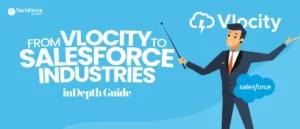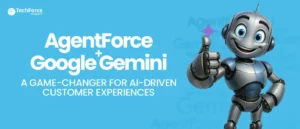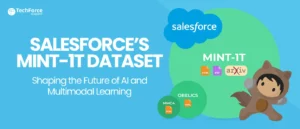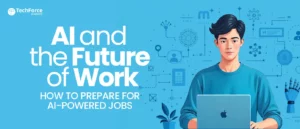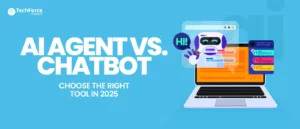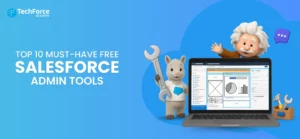The demand for skilled Salesforce developers is growing quickly as the Salesforce ecosystem keeps expanding. To stay competitive in 2025, mastering the essential Salesforce developer skills is crucial. So understanding the key technical skills and soft skills will set you apart in the dynamic CRM landscape.
With Salesforce dominating the CRM landscape, businesses need developers who can customise solutions, integrate complex systems, and streamline processes using the latest tools and technologies.
In this blog, we’ll explore the critical skills, certifications, and tools you need to become a high-demand Salesforce developer. We’ll also discuss emerging trends like AI integration and declarative automation to help you future-proof your career.
Who is a Salesforce Developer?
A Salesforce developer is a professional who designs, develops, and customises applications on the Salesforce platform. They also create solutions within the Salesforce platform to meet specific business needs.
They use Visualforce, Lightning Web Components (LWC), and Salesforce APIs (Salesforce’s programming languages). To understand the requirements that craft solutions for the business goals they work with the stakeholders.
Interested in this career path? Enrol in our Salesforce Platform Developer 1 online certification course.
Salesforce Developer Roles and Responsibilities

They play a main role in improving the functionality of Salesforce CRM,
ensuring it meets the organisation’s objectives. They work to improve Salesforce’s functionality and often collaborate with Salesforce partners to integrate the platform with other systems, using tools like APIs to ensure seamless data flow.
Salesforce Developers’ key responsibilities include:
1. Ensuring Quality and Performance
They ensure that custom applications within the Salesforce environment meet security, scalability, and performance standards.
2. Custom Application Development
They design and develop custom applications to support specific business workflows.
3. Coding and Data Management
This involves:
- Writing clean, maintainable code using Apex and Visualforce.
- Effectively managing data using SOQL and SOSL.
4. Optimisation and Testing
Developers optimise, test, and debug code to ensure optimal performance.
5. Collaboration and Innovation
They collaborate with cross-functional teams to deliver innovative solutions.
6. Continuous Learning
Continuous improvement by staying updated with new salesforce releases and features to optimise system performance.
Salesforce Developer skills
Technical and soft skills are primary skills for a Salesforce Developer. The below-listed skills are required for Salesforce Developer:
Technical Skills for Salesforce Developers

To succeed as a Salesforce developer, mastering a diverse set of Salesforce developer technical skills is essential. Key technical skills include:
- Apex Programming – The core Salesforce coding language used in Salesforce development for automation and backend processing. It allows developers to execute flow and transactions on the Salesforce platform. It is similar to Java, which is a strongly typed object-oriented language.
- Visualforce – Used to create custom user interfaces within Salesforce CRM. It is similar to HTML, a tag-based markup language allowing for the development of custom pages that integrate with salesforce data.
- Lightning Web Components (LWC) & Lightning Components – Modern frameworks for building dynamic, responsive applications using JavaScript and HTML. LWC is the newer, more performant model, focusing on reusable components.
- Java & JavaScript – Essential for developing custom functionalities and front-end interactions. Java is used for backend integrations and JavaScript is useful for building dynamic functionalities, especially in visual pages and lightening web components.
- HTML & CSS – Fundamental for designing engaging and responsive user interfaces. HTML structures web pages, and CSS styles them.
- Custom Objects & Data Modeling – Structuring and managing data efficiently. To suit your business needs custom objects allow you to extend the data model. The relationship between the objects, fields, and records in Salesforce comes under data modeling.
- SOQL & SOSL – Used for querying data within the Salesforce Platform. The SOQL (Salesforce Object Query Language) retrieves data from specific objects. Searching across several objects is possible with SOSL (Salesforce Object Search Language).
- Salesforce DX – A development lifecycle toolset for better team collaboration and version control. It is designed to improve the developer experience in managing and building the salesforce applications.
- Integration Skills – Connecting Salesforce with external applications using APIs like REST and SOAP. Integrating with other systems is a crucial aspect of a Salesforce Developer’s role.
- Testing & Debugging – Ensuring code quality and performance through debugging tools like the developer console, debug logs, and testing frameworks to ensure the system works efficiently.
Soft Skills for Salesforce Developers
Beyond technical expertise, successful Salesforce developers possess strong soft skills that enhance productivity and teamwork:

- Effective Communication – The ability to communicate both the technical and non-technical concepts to the stakeholders.
- Creativity and Problem-Solving – Developing innovative solutions to complex problems, and thinking outside the box for the salesforce.
- Adaptability – Staying updated with tools and client requirements, and being open to change.
- Analytical skills – For optimising salesforce applications effectively such as evaluating data, workflows, and system performance.
- Collaboration and Teamwork – To ensure smooth project execution, working efficiently with cross-functional teams, including admins, testers, and business analysts.
- Time Management – Prioritising tasks and meeting project deadlines to deliver high-quality Salesforce solutions.
- Critical Thinking – Making well-informed decisions for custom development and integrations by assessing challenges logically.
- Passion for Learning Salesforce – Continuously upgrading Salesforce skills and staying current with Salesforce’s evolving ecosystem, certifications, and best practices.
Develop essential technical and soft skills with our Salesforce Developer certification course.
Essential Emerging Skills for Salesforce Developers in 2025
Proficiency in Salesforce Einstein AI for Predictive Analytics
As a Salesforce developer, you must possess proficiency in Salesforce Einstein AI in 2025 to leverage its predictive analytics capabilities. Einstein AI empowers you to build intelligent applications that can analyse data, identify patterns, and make predictions.
You can use Einstein AI to automate tasks, personalise user experiences, and improve decision-making.
Expertise in Generative AI Tools (GPT for CRM Automations)
In 2025, you will need expertise in generative AI tools like GPT to automate CRM processes. GPT can generate human-like text, enabling you to create chatbots, automate email responses, and personalise customer interactions.
By integrating GPT into CRM workflows, you can streamline operations, improve efficiency, and enhance customer engagement.
Knowledge of Salesforce Flow for Declarative Automation
Salesforce Flow will remain a critical skill in 2025. Flow provides a visual interface for designing and implementing business processes, allowing you to create workflows, automate tasks, and integrate with other systems.
By mastering Flow, you can empower business users to manage their own automations, reducing the need for custom code and accelerating development cycles.
Working with Salesforce Data Cloud
As data becomes increasingly important, in 2025 you must be proficient in working with Salesforce Data Cloud. Data Cloud provides a unified platform for collecting, harmonising, and analysing data from various sources.
You can use Data Cloud to build a comprehensive view of customers, personalise experiences, and gain valuable insights. By mastering Data Cloud, you can create data-driven solutions that drive business growth and improve customer relationships.
Level up your Data Cloud skills and learn the latest Data Cloud techniques with our Salesforce Data Cloud Training.
Enhance Skills by Mastering These 5 Salesforce Development Tools in 2025
Integrated Development Environment (IDE) Tool
An IDE provides a suite of tools to simplify software development. Salesforce offers Code Builder, a web-based IDE pre-configured with the latest frameworks and languages, including Lightning Web Components, Apex, and SOQL.
It provides preloaded Salesforce extensions, CLIs, and generative AI capabilities, allowing developers to customise the CRM directly from the web without complex configuration. Code Builder is available for Salesforce Editions and above at no extra cost.
Continuous Integration (CI) Tools
CI tools automate building and testing code changes in a shared repository. They monitor the repository, test new code, and integrate with third-party tools to streamline development and improve code quality.
Popular CI tools include:
- CircleCI, a cloud-based and on-premise solution.
- Jenkins, an open-source tool that automates building, testing, and deploying.
- Travis CI, a hosted platform for building and testing Salesforce applications on GitHub.
Code Analysis Tools
Code analysis tools help identify potential issues early in development. Salesforce offers Code Analyzer, which integrates with CLI, IDE, and CI tools to provide a unified view after code scanning.
It helps ensure code follows best practices and includes rules aligned with the AppExchange security review process.
Mobile App Development
Salesforce offers tools to simplify mobile app customisation through low-code and no-code approaches. Lightning Web Components (LWC) and LWC Offline are frameworks used to build Salesforce mobile applications.
LWC allows online and offline customisation, optimising app features for low connectivity. LWC Offline provides an advanced runtime environment for LWC, enabling offline functionality within Salesforce mobile apps.
AI-Powered Developer Tools
AI can significantly accelerate Salesforce development. Agentforce for Developers, an AI-powered tool, offers a Visual Studio Code extension with features like:
- Dev Assistant, which helps write Apex and LWC code through natural language prompts.
- Inline Code Completion, which suggests code completions in Apex, LWC, CSS, HTML, and JavaScript.
- Test Case Generation for Apex, which helps create unit test cases for quick Apex testing before deployment.
Important Salesforce Certifications to Become a Salesforce Developer
Certifications enhance credibility and increase job prospects. For aspiring Salesforce Developers, these are some key certifications to consider:
- Salesforce Certified Platform Developer I – This is the foundational certification for Salesforce Developers. It validates core coding and development skills in Apex, Visualforce, and other platform technologies. It’s highly recommended as a starting point.
- Salesforce Certified Platform Developer II – This advanced certification builds upon Platform Developer I and demonstrates deeper expertise in complex development scenarios, including architecture, design patterns, and performance optimisation.
- Salesforce JavaScript Developer I – Focuses on JavaScript skills for Lightning Web Components.
- Salesforce Certified B2B Commerce Developer – Ideal for those working with Salesforce B2B Commerce.
- Salesforce Certified Integration Architecture Designer – While not strictly a developer certification, this is valuable for developers who specialise in integrating Salesforce with other systems.
Resources for Learning Salesforce Development
To build a successful career in Salesforce development, continuous learning is key. Here are some valuable resources:
- Certifications – TechForce Academy offers expert-led Salesforce development training for beginners.
- Salesforce Trailhead – Provides free, interactive learning modules.
- Trailblazer Community – Engage with the Salesforce developer community on forums like the Trailblazer Community.
- Events and Webinars – Attend Salesforce events like Dreamforce and webinars to gain insights from industry experts. Read about the Dreamforce 2025 dates and other details.
- Salesforce Developer Forums & Communities – Engage with experienced professionals and stay updated.
- Keep Up with Release Updates – Salesforce releases updates 3 times a year (Winter, Spring, and Summer). You should actively track these releases to leverage new features, understand changes, and maintain application compatibility.
Read more about the Salesforce Spring’25 Release.
Conclusion
Specialising the essential salesforce developer skills in 2025 is important for staying ahead in the competitive workforce market. The combination of technical and soft skills helps in securing rewarding opportunities in expanding the Salesforce ecosystem.
In 2025 it goes beyond technical skills, it’s about adapting to the latest trends, gaining hands-on experience, and continuously learning.
By mastering tools like Apex, Lightning Web Components, and Salesforce Flow, while keeping up with emerging technologies like AI and automation, you’ll position yourself as an invaluable asset in the Salesforce ecosystem.
The opportunities are endless, take the first step today to shape your future as a top-tier Salesforce developer!



